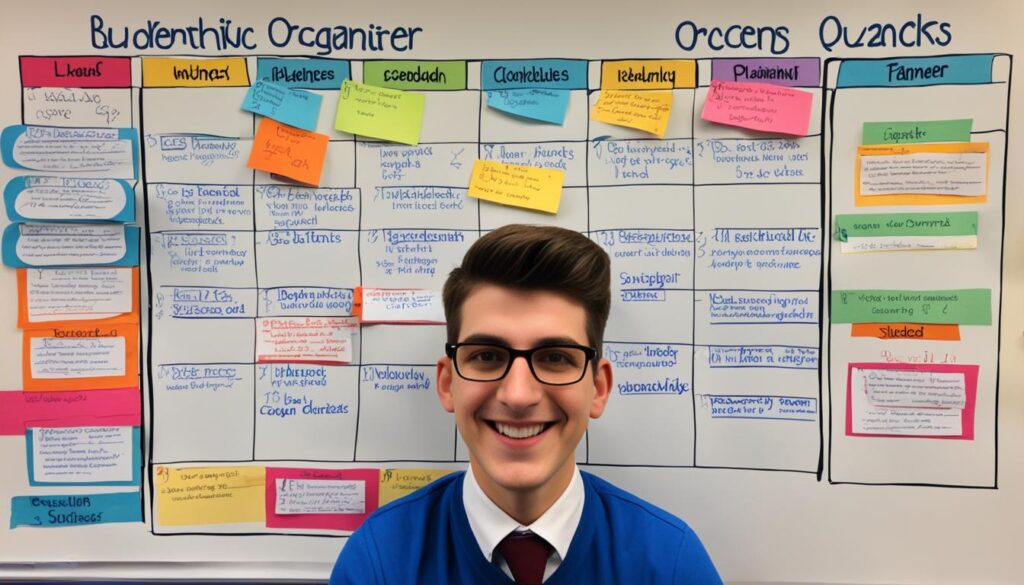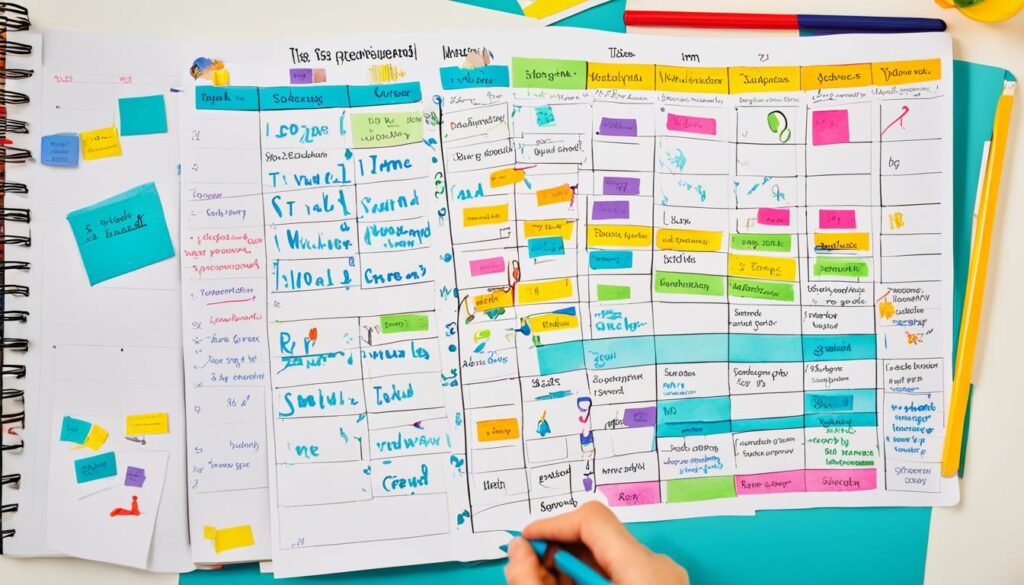Master Your Future: Why Time Management is Key for Students

Do you ever feel like there’s never enough time in the day to accomplish everything you need to do? Are you constantly rushing to finish assignments, studying at the last minute, and feeling overwhelmed by your workload? If so, it’s time to consider the importance of time management in your student life.
Effective time management is not just about ticking off tasks on a to-do list. It’s about optimizing your schedule, prioritizing your responsibilities, and finding the right balance between work and play. By mastering the art of time management, you can unlock a world of possibilities and set yourself up for success in both your academic pursuits and future endeavors.
Key Takeaways:
- Effective time management helps students stay organized, reduce stress, and improve productivity.
- Prioritizing tasks and setting realistic goals are essential components of time management.
- Creating a schedule and avoiding procrastination are key strategies for optimizing your time.
- Identifying and eliminating time wasters can significantly enhance your productivity.
- Developing effective study habits plays a crucial role in effective time management.
The Importance of Prioritizing Tasks
Prioritizing tasks is a fundamental aspect of effective time management for students. By understanding the importance of prioritization, you can enhance your time management skills and achieve greater efficiency in your academic endeavors.
One of the key steps in prioritizing tasks is creating a to-do list. This simple yet powerful tool allows you to mentally organize your tasks and ensures that you don’t miss any important deadlines or assignments. Take a moment each day to jot down everything that needs to be accomplished, whether it’s studying for an upcoming exam, completing a project, or attending a class.
Once you have your to-do list, it’s crucial to identify the urgent and important tasks. Urgent tasks require immediate attention and cannot be delayed, while important tasks contribute significantly to your goals and overall success. By categorizing your tasks based on urgency and importance, you can allocate your time more effectively.
When prioritizing tasks, it’s essential to allocate your time based on these priorities. Start with the most crucial assignments and focus on completing them first. This strategy helps you stay focused and avoid feeling overwhelmed by your workload. By tackling urgent and important tasks early on, you reduce the risk of procrastination and ensure that you meet deadlines successfully.
Remember, effective time management is all about making the most of your limited time. By prioritizing tasks and completing them in order of importance, you can optimize your productivity and achieve better results. So, take charge of your tasks, set clear priorities, and watch your time management skills soar!

The Benefits of Prioritizing Tasks
- Focus: By prioritizing tasks, you can focus your energy and attention on the most important and urgent ones, ensuring that you give them the time and effort they deserve.
- Efficiency: Prioritization helps you complete tasks in a logical order, reducing wasted time and enhancing overall efficiency.
- Stress Reduction: By addressing important tasks early on, you can prevent last-minute panic and reduce stress levels.
- Goal Achievement: Prioritizing tasks allows you to work towards your goals in a structured and organized manner, increasing your chances of achieving them.
Setting Realistic Goals for Success
Setting realistic goals is crucial for effective time management in education. When you establish specific, measurable, attainable, relevant, and time-bound (SMART) goals, you create a clear roadmap for your academic journey. These goals serve as guideposts, providing direction and motivation to keep you focused on your objectives.
Whether your goals are related to academic achievements, personal growth, or extracurricular pursuits, breaking them down into smaller, actionable tasks is key. This allows you to track your progress and maintain a sense of accomplishment along the way. By setting realistic goals, you can manage your time effectively and work towards success.
Benefits of Setting Realistic Goals
Setting realistic goals has several benefits, both in and out of the classroom. Here are some advantages to consider:
- Enhanced Focus: Clear goals provide a sense of direction, helping you prioritize tasks and allocate your time accordingly.
- Motivation: Having well-defined goals motivates you to stay committed and take action towards achieving them.
- Progress Tracking: Breaking larger goals into smaller tasks allows you to monitor your progress and stay on course.
- Time Optimization: By setting realistic goals, you can allocate your time effectively, ensuring that every moment counts.
Setting realistic goals is not only essential for time management but also for personal growth and overall success. When you have a clear vision of what you want to achieve and a plan in place, you can make the most of your educational journey.
| Goal | Tasks |
|---|---|
| Achieve a 3.7 GPA this semester | 1. Attend all classes and actively participate 2. Complete all assignments on time 3. Study for exams regularly 4. Seek help from professors or tutors when needed |
| Participate in a leadership position in a campus club | 1. Research different clubs and their leadership opportunities 2. Attend club meetings regularly 3. Take on additional responsibilities within the club 4. Collaborate with other club members to organize events or initiatives |
Creating a Schedule for Optimal Time Management
Creating a schedule is a powerful tool for effective time management. When it comes to managing your time as a student, finding a method that works best for you is crucial. Whether you prefer using a digital calendar, a physical planner, or a time-management app, the key is to choose a system that aligns with your preferences and lifestyle.
By allocating dedicated time slots for various activities, you can ensure that you make the most of your time. This includes setting aside specific blocks for studying, attending classes, completing assignments, and engaging in leisure activities. By creating a well-balanced schedule that incorporates breaks and allows for self-care, you can maintain a healthy work-life balance and maximize your productivity.
To illustrate, here is an example of how your schedule might look:
| Time | Activity |
|---|---|
| 8:00 AM – 9:00 AM | Morning routine and breakfast |
| 9:00 AM – 11:00 AM | Study session 1 |
| 11:00 AM – 12:00 PM | Classes |
| 12:00 PM – 1:00 PM | Lunch break |
| 1:00 PM – 3:00 PM | Study session 2 |
| 3:00 PM – 5:00 PM | Group project meeting |
| 5:00 PM – 6:00 PM | Exercise and self-care |
| 6:00 PM – 8:00 PM | Free time |
| 8:00 PM – 10:00 PM | Study session 3 |
| 10:00 PM – 11:00 PM | Wind down and relax |
Remember, this is just an example, and you should customize your schedule to fit your specific needs and preferences.
By creating a schedule that reflects your priorities and allows for flexibility, you can optimize your time management and enhance your overall academic performance.

Avoiding Procrastination for Better Time Management
Procrastination can be a major obstacle to effective time management. As a student, it’s important to understand the reasons behind your tendency to procrastinate. Fear of failure or feeling overwhelmed by your workload can often contribute to this habit.
To overcome procrastination and stay on track with your time management, try breaking down your tasks into smaller, more manageable parts. By focusing on one smaller task at a time, you can reduce the feeling of being overwhelmed and increase your motivation to get started.
Another technique that can help you overcome procrastination is the Pomodoro Technique. This time management method involves setting a timer for a specific amount of time, typically 25 minutes, and fully immersing yourself in a task during that time. After the timer goes off, take a short break before starting the next Pomodoro session. This technique can help you stay focused and make progress without feeling overwhelmed.
Creating accountability can also be a powerful tool in combating procrastination. Consider joining a study group or finding a study buddy who shares your goals and can hold you accountable for completing your tasks. This level of support and encouragement can help you stay motivated and committed to managing your time effectively.

Eliminating Time Wasters for Greater Productivity
Time management is essential for students to make the most of their valuable time. However, it’s easy to get sidetracked by common time wasters that can significantly impact your productivity. By identifying these time wasters and taking steps to eliminate them, you can optimize your time management skills and achieve greater efficiency in your studies.
One common time waster for students is excessive use of social media. It’s easy to get caught up in scrolling through feeds and checking notifications, which can eat into your study time. To minimize this distraction, consider setting designated “device-free” study periods. During these periods, put your phone on silent mode or place it in another room to avoid temptation.
Aimless web browsing is another time waster that can hinder your productivity. You may find yourself getting lost on the internet, exploring unrelated topics or getting lost in a sea of information. One effective strategy to minimize this is by using website blockers. These applications or browser extensions can block certain websites or limit your access to them during your study sessions, helping you stay focused on the task at hand.
Creating a conducive study environment is crucial for eliminating time wasters. Find a quiet and comfortable space where you can concentrate without distractions. Remove any unnecessary clutter or objects that may divert your attention. This dedicated study space will help you stay focused and minimize time wasted on searching for study materials or getting distracted by your surroundings.
By being mindful of your time usage and actively choosing productive activities, you can optimize your productivity and make the most of your valuable time. Instead of engaging in passive activities like binge-watching TV shows or aimlessly scrolling through social media, prioritize tasks that align with your goals and bring you closer to academic success.
Tips for Eliminating Time Wasters
- Create designated “device-free” study periods to minimize the distraction of social media and phone notifications.
- Use website blockers to limit access to distracting websites during study sessions.
- Designate a quiet and clutter-free study environment to minimize distractions and stay focused.
- Prioritize productive activities that align with your goals instead of engaging in passive time-wasting behaviors.
By implementing these strategies and eliminating time wasters, you can enhance your time management skills and achieve greater productivity. Stay focused, disciplined, and committed to making the most of your time, and you’ll see positive results in your academic performance and overall well-being.

| Time Waster | Effect on Productivity | Strategies for Elimination |
|---|---|---|
| Excessive use of social media | Reduces focus and study time | Create designated “device-free” study periods, prioritize tasks over social media, limit phone notifications |
| Aimless web browsing | Distracts from study tasks | Use website blockers, set specific study goals, limit access to distracting websites |
| Lack of a conducive study environment | Leads to distractions and disorganization | Create a clutter-free study space, remove distractions, optimize lighting and comfort |
| Engaging in passive time-wasting activities | Wastes time and decreases productivity | Prioritize productive tasks, set goals, engage in activities aligned with your academic pursuits |
Developing Effective Study Habits for Time Management
Effective study habits play a crucial role in mastering time management skills for students. By developing routines and strategies that enhance studying efficiency, you can optimize your time and achieve academic success.
One valuable technique is to create a study routine. Establish a consistent schedule where you dedicate specific blocks of time to studying. This helps you develop discipline and ensures that studying becomes a regular part of your daily routine. By sticking to a study routine, you can manage your time effectively and make progress towards your academic goals.
Another effective strategy is to incorporate active learning techniques into your study sessions. Active learning engages your mind, helping you retain information better. Some techniques you can try include summarizing information in your own words, teaching concepts to others, or participating in group discussions. By actively engaging with the material, you can improve your understanding and make the most of your study time.
Creating a distraction-free study space is also essential for effective time management. Find a quiet, well-lit area where you can focus and minimize interruptions. Keep your study space free from distractions such as electronic devices and noise. This way, you can concentrate on your work and stay on track.
Additionally, it is important to strike a balance between focused study time and breaks. Taking regular breaks during your study sessions can help refresh your mind and prevent burnout. Consider using the Pomodoro Technique, where you work for a set amount of time (e.g., 25 minutes) and then take a short break (e.g., 5 minutes). This approach can help you maintain productivity and avoid fatigue.
To summarize, developing effective study habits is essential for improving time management skills as a student. By creating a study routine, incorporating active learning techniques, maintaining a distraction-free study space, and balancing focused study time with breaks, you can enhance your ability to manage your time effectively and achieve academic success.
Conclusion
Mastering time management is crucial for students to excel in their academic journey and beyond. By honing essential time management skills, you can enhance your organizational abilities, alleviate stress, and achieve your educational and personal aspirations. The importance of time management in education cannot be overstated, as it empowers you to prioritize tasks, set realistic goals, create effective schedules, avoid procrastination, eliminate time wasters, develop efficient study habits, and seek support when needed.
By prioritizing tasks based on their urgency and importance, you can stay focused and meet deadlines, ensuring you make the most of your time. Setting attainable goals allows you to maintain direction and motivation while breaking down larger objectives into manageable tasks enhances your progress tracking. Creating a well-balanced schedule enables optimal utilization of your time for studying, attending classes, and indulging in leisure activities, fostering a healthy work-life balance and maximizing productivity.
Avoiding procrastination and eliminating time wasters are pivotal in optimizing your time management skills. By overcoming the temptation to delay tasks and minimizing distractions like excessive social media usage, you can stay on track and make the most of your valuable time. Cultivating effective study habits, such as developing routines, employing active learning techniques, and creating dedicated study spaces, enhances your studying efficiency and strengthens your time management abilities.
Remember, time management is not just a skill for the present; it is a lifelong competency that will benefit you in all aspects of your life. By mastering time management principles during your educational journey, you are equipping yourself with foundational skills that will pave the way for future success. So, embrace the power of time management, unlock your full potential, and create a pathway to a bright and accomplished future.
FAQ
Why is time management important for students?
Time management is important for students because it helps them stay organized, reduce stress, and improve productivity. By effectively managing their time, students can prioritize tasks, set realistic goals, and create schedules that optimize their study time and leisure activities. Time management allows students to accomplish their goals faster, increase efficiency, and maintain a healthy work-life balance.
What are the benefits of time management for students?
The benefits of time management for students are numerous. It allows students to enhance their organizational skills, reduce stress levels, and improve their overall productivity. By prioritizing tasks, setting realistic goals, and creating a schedule, students can stay focused, meet deadlines, and avoid feeling overwhelmed by their workload. Effective time management also helps students develop discipline, increase efficiency, and achieve their academic and personal goals.
How can students prioritize tasks effectively?
Students can prioritize tasks effectively by creating to-do lists and identifying urgent and important tasks. By allocating time based on these priorities, students can ensure they complete their most crucial assignments first. Prioritizing tasks helps students stay focused, meet deadlines, and avoid feeling overwhelmed. By enhancing their time management skills through task prioritization, students can achieve greater efficiency in their academic pursuits.
Why is setting realistic goals important for effective time management?
Setting realistic goals is important for effective time management because it provides students with a sense of direction and motivation. By setting specific, measurable, attainable, relevant, and time-bound (SMART) goals, students can break larger objectives into smaller, actionable tasks. This allows them to track their progress, maintain focus, and manage their time effectively. Setting realistic goals helps students work towards success and enhance their time management skills.
How can students create a schedule for optimal time management?
Students can create a schedule for optimal time management by finding a method that works best for them, whether it’s using a digital calendar, a physical planner, or a time-management app. By allocating dedicated time slots for studying, attending classes, completing assignments, and engaging in leisure activities, students can ensure they utilize their time efficiently. A well-balanced schedule includes breaks and time for self-care, allowing students to maintain a healthy work-life balance and maximize their productivity.
What are some strategies to avoid procrastination and improve time management?
To avoid procrastination and improve time management, students can break tasks into smaller, manageable parts and use techniques like the Pomodoro Technique. Additionally, creating accountability through study groups or study buddies can help students combat procrastination. By understanding the reasons behind procrastination, such as fear of failure or feeling overwhelmed, students can overcome these challenges and stay on track with their tasks and goals.
How can students eliminate time wasters for greater productivity?
Students can eliminate time wasters for greater productivity by identifying common distractions, such as excessive use of social media or aimless web browsing, and taking steps to minimize them. Setting designated “device-free” study periods, using website blockers, or creating a conducive study environment are some strategies to avoid time wasters. By being mindful of their time usage and actively choosing productive activities, students can optimize their productivity and make the most of their valuable time.
What are some effective study habits that enhance time management?
Developing effective study habits is closely tied to time management. Students can create a study routine, use active learning techniques, and maintain a distraction-free study space to enhance their studying efficiency. By balancing focused study time with breaks and incorporating strategies that work best for them, students can improve their time management skills and achieve academic success.
Why is time management a critical skill for student success?
Time management is a critical skill for student success because it enhances organizational skills, reduces stress levels, and allows students to achieve their academic and personal goals. By mastering time management principles such as prioritizing tasks, setting realistic goals, creating a schedule, avoiding procrastination, eliminating time wasters, developing effective study habits, and seeking support, students can optimize their time. Time management is a lifelong skill that extends beyond the academic realm and prepares students for future success in all aspects of their lives.






